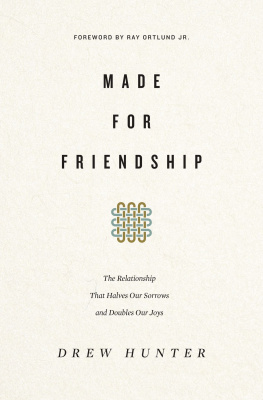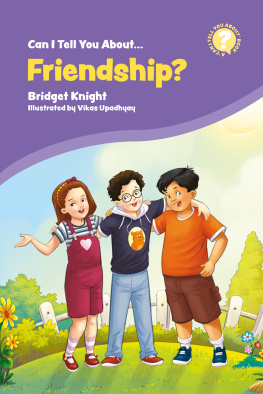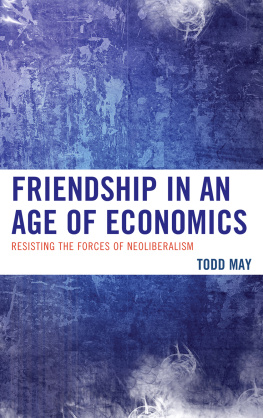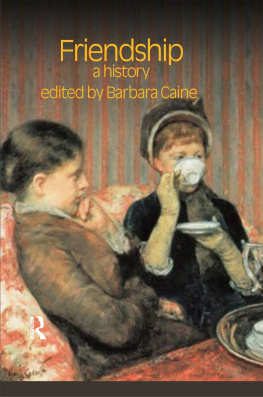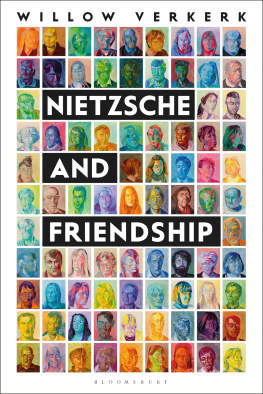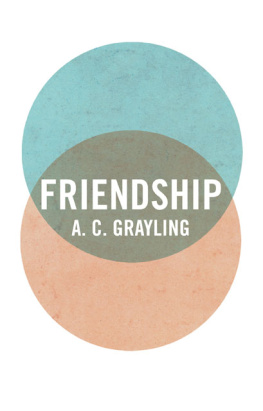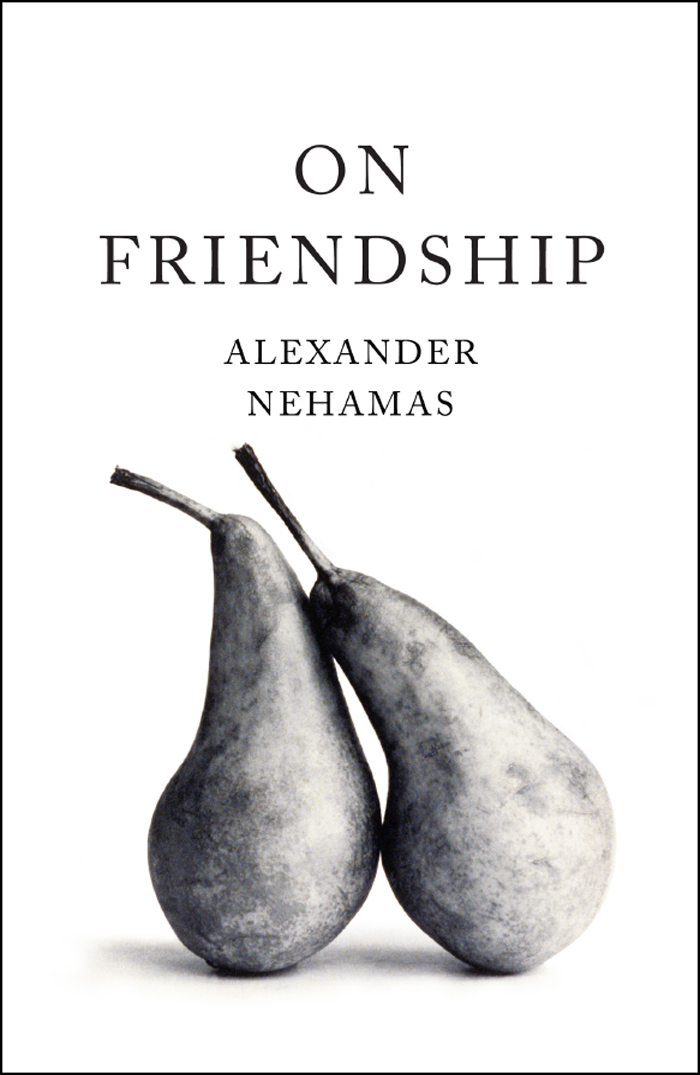More Advance Praise for On Friendship
Beautiful and wise, On Friendship will deepen your understanding of the friendships through which you live. Can a work of philosophy be a page-turner? This one is hard to put down. Here Montaigne triumphs over Aristotle, while theater emerges as the art that best illuminates friendshipwhich, as Nehamas shows us, is best appreciated as a work of art is appreciated, for what it is for us, individually and irreplaceably.
Paul Woodruff, professor of philosophy and classics, University of Texas at Austin
On Friendship accomplishes the remarkable; Nehamas punctures standard pieties with clear-eyed realism about the risks of loss or corruption through our friendships, while saving every bit of our unshakeable sense that our friends remain immeasurably valuable, and of central importance in our lives. This deeply insightful bookthe fruit of a lifetimes reflectionshould be read not only by those who care about friendship in general, but by all of us who care about our friends.
R. Lanier Anderson, professor of philosophy, Stanford University

ALSO BY ALEXANDER NEHAMAS
Nietzsche: Life as Literature
The Art of Living:
Socratic Reflections from Plato to Foucault
Virtues of Authenticity:
Essays on Plato and Socrates
Only a Promise of Happiness:
The Place of Beauty in a World of Art

Copyright 2016 by Alexander Nehamas
Published by Basic Books,
A Member of the Perseus Books Group
All rights reserved. Printed in the United States of America. No part of this book may be reproduced in any manner whatsoever without written permission except in the case of brief quotations embodied in critical articles and reviews. For information, contact Basic Books, 250 West 57th Street, New York, NY 10107.
Books published by Basic Books are available at special discounts for bulk purchases in the United States by corporations, institutions, and other organizations. For more information, please contact the Special Markets Department at the Perseus Books Group, 2300 Chestnut Street, Suite 200, Philadelphia, PA 19103, or call (800) 810-4145, ext. 5000, or e-mail .
Designed by Trish Wilkinson
Set in 11.5-point Adobe Caslon Pro
Library of Congress Cataloging-in-Publication Data
Names: Nehamas, Alexander, 1946 author.
Title: On friendship / Alexander Nehamas.
Description: First Edition. | New York: Basic Books, 2016. | Includes bibliographical references and index.
Identifiers: LCCN 2015041476 (print) | LCCN 2015042413 (ebook) | ISBN 9780465098613 (ebook)
Subjects: LCSH: Friendship.
Classification: LCC BJ1533.F8 N44 2016 (print) | LCC BJ1533.F8 (ebook) | DDC 177/.62dc23
LC record available at http://lccn.loc.gov/2015041476
10 9 8 7 6 5 4 3 2 1
For Tom
Table of Contents
Guide
Contents
IN THE PAST FEW YEARS, I HAVE HAD OCCASION TO travel to Greece, where I was born, on a more or less regular basis. The reasons for my trips were professional, the trips themselves were shortthree days at mostand my schedule, crowded. But whenever I could, I would spend at least one evening in Athens in the company of a group of friends who have kept up the most striking relationship since our graduation from high school over fifty years ago.
Most of the group were boarderssome of us for as long as ten years. The school was academically rigorous and the boarding department was particularly regimented: all our activitieswaking, washing, entering the dining room, studying, going to bed, and many otherswere controlled by loud electric bells that usually gave us just enough time to get to our next task, and we were punished whenever we were late. Some of the boys were, like me, from Athens, where the school was located. Several came from other parts of Greece and a large number came from abroad, where their families had moved for one reason or another. Our dormitories gave us little privacy, we all belonged to the same section of our class, and we were also under constant supervision. All of that drew us very close to one anothermany of us spent weekends and part of our vacations at one anothers homesand we formed intense and long-lasting friendships (and equally intense if not always as long-lasting breakups and antipathies).
My friends were to spend much of their lives together. Right after graduation, I left Athens to study in the United States, where I have been living since then, and it was a while before I was in touch with them again. I was amazed at how easy it was to rejoin their group and how relaxed and comfortable they all made me feel as soon as I did. I suspect that that was in part because, as we were reacquainting ourselves with one another, I recognized in them some of the most characteristic features I remembered them having when we were still in school. One, now a surgeon, is still the funny man of the group, his spontaneous sense of humor quite unchanged even after all these years; another, who always loved flying, has a son who is a pilot for a commercial Greek airline; a third has remained blindly devoted to the soccer team he followed in school and never misses a single gameand I am sure that they recognized similar features in me as well. Every one of us, of course, has also undergone many changes, and at least some are to the good. Most important, we can appreciate what we once were and liked about each other without the insecurities, the resentments, and the competitiveness of adolescence: our interactions are now easier, milder, and more consistently affectionate, even if they are less dramatic or passionate than they were at the time.
The group meets regularly, usually on Sunday evenings; some play cards, others just to see one another and talk. They go out to dinner together, especially (though not exclusively) when they welcomeas they always doold classmates like me, who live abroad. Often, these dinners become elaborate affairs at someones home, and their wives, who are also friends with one another, join in. Some spend family vacations together, others (husbands and wives both) have become godparents of some of their friends children. Although originally they may have begun to keep in touch in order to keep their past alive and still enjoy thinking back to it, as they (and I with them) often do, their friendship has gradually become much more than an opportunity to wax nostalgic: the activities I have mentioned, and everything that goes with such close and protracted contact, have had nothing less than a profound, all-embracing effect on the shape of their lives and the lives of their families.
To say that their friendship has had an effect on their lives is to say that it has had an effect on themselves. When I realized that these people are who they have come to be, at least in part (and it is a large part) because of their friendship, I also realized that friendship, even when motivated by a desire to regain a common past, is also crucial in forging a different future. Who we are is to a great extent determined by our friends, whose role in our life is more pervasive and all-encompassing the closer our relationship happens to be. Our friendships are not inert. My classmates friendship spreads out within their life: it suffuses it. Every friendship of ours is more or less closely connected with everything else about us: every one of our friends, the more so the more intimate we are, influences the direction our life takes, just as our lifes direction influences our choice of friends. Friendship is crucial to what most of us come to be in life.





